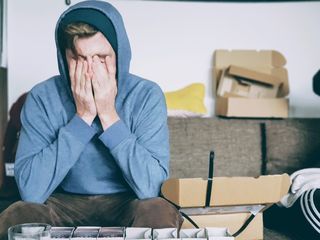Sleep
It's Okay to Not Be Okay Right Now
Feeling overwhelmed has become our new normal.
Posted March 20, 2020

You are probably feeling extremely stressed, fatigued, and overwhelmed right now. The good news is that you are completely normal for feeling this way. The bad news is that this has become our new normal. How did we get here, and how do we protect ourselves emotionally?
First, the lack of testing and accurate information available to the general public has increased people's levels of anxiety. This is completely understandable. The more accurate information we possess, the more we know where we stand. Education also means that we have a better idea of what precautions we need to take to protect ourselves and our families.
We have a president who, when asked by a reporter, "What do you say to Americans who are watching you right now who are scared?" responded, "I'd say that you're a terrible reporter." Historically, the leader of our country is supposed to provide calm and guidance to the citizens. Instead, we are thrown into more chaos, and our feelings of fear are not validated.
You have a right to feel scared. I'd be more concerned if you weren't scared right now. You may also be dealing with losing your job or trying to work from home while your kids are out of school for the foreseeable future. You may have elderly and other high-risk family members whom you are prohibited from visiting. You may have family members who now have COVID-19. You may have family members who are still working because they have essential jobs—like medical staff, grocery store staff, utility staff, and first responders.
Try to Get Adequate Sleep
It may be really difficult for you to get restful sleep right now. You may have a family member who is working extended hours, and understandably, you are concerned about whether they will get sick. It is of the utmost importance that you try to get as much sleep as you can.
Contact your doctor if you are having difficulties sleeping. Let them know why. When we aren't getting enough sleep, we have more difficulty making decisions, thinking rationally, and keeping our moods stable. And we are already having enough issues doing those things due to our current stress levels.
Good sleep habits include turning off electronic devices at least an hour before bed and having an "unwind" activity before sleep. A consistent sleep and wake time is also beneficial. Usually, you would read information about avoiding naps, since they may disturb your sleep schedule. Now is the time to nap. Getting enough sleep has been found to help beef up your immune system, and as of now, it is one of the most effective ways to fight this virus.
Exercise on a Regular Basis
One of the other most effective ways to fight this virus is to have an exercise regimen. Stay active. If exercise is not part of your regular routine, the important thing is that you are moving. Dance around with your kids, play catch—any activity counts. It's also a good way to connect with your kids, since you may be spending a lot more time with them than you ever anticipated.
Spend Time Outside
Even if you are in an area that has a "shelter in place" policy, you are allowed to be outside, including taking walks and hikes—provided that you keep a distance of at least 6 feet from others (not including the people who are currently sharing space in your home). It is healthy and necessary to be outdoors.
Meet With a Mental Health Professional
Many mental health professionals (myself included) have moved to online or phone counseling sessions. Make sure your mental health professional is using a HIPAA-compliant video service. When you call or email to make an appointment, ask him or her if their video service is HIPAA-compliant. If he or she is not sure, ask them to find out that information and contact you when they have it. In the meantime, contact other mental health professionals.
Be Aware That You May Be Experiencing PTSD Triggers
If you have already been through a trauma, excessive stress, like we are experiencing right now, can lead to your PTSD symptoms worsening. This is especially the case if your trauma was due to illness, death, or lack of resources. Caregivers can also have increased PTSD symptoms, whether you are currently caring for someone or have in the past. If you are not feeling like yourself, contact a mental health professional as soon as possible.
Be Kind to Yourself and Others
We are all making this up as we go along. Very few of us have been through a pandemic before. We are also living in tighter quarters with family members for a longer period of time than we ever anticipated. People are going to get cranky.
We should still set healthy boundaries—for example, yelling at another person is not allowed. But do give some allowance for people being snappier than usual. Keep in mind that it is rarely personal. And be kind to yourself.
Copyright 2020 Sarkis Media




